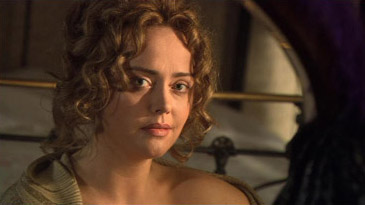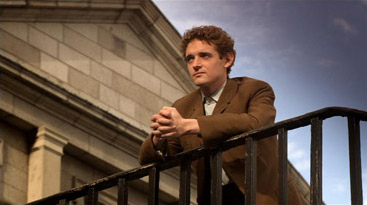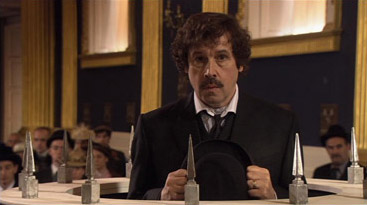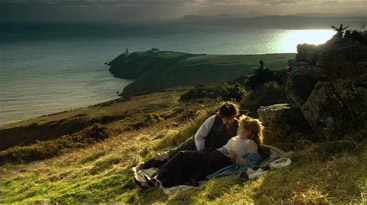"History is a nightmare from which I am trying to awake." |
Stephen Dedalus |
If awards were given for the length of time taken to bring a project from that first spark of an idea, to a fully realised film, unfolding on screen, then Sean Walsh, director of Bloom would surely be the hotly-tipped favourite amongst the nominees. His adaptation of James Joyce's famed novel Ulysses was over ten years in the making, and given the complexity of the task at hand, it's no great surprise. While Ulysses is arguably one of Joyce's most well-known work, it's also probably the least read, quite simply because its structure is something of an exercise in discipline, it's an unforgiving work; for those that make it, the rewards are undeniable, but it's not an easy journey. With the possible exception of Laurence Streme's Tristam Shandy (the so-called 'unfilmable novel' itself brought to screen in 2005 by Michael Winterbottom as Tristam Shandy: A Cock and Bull Story), there aren't many novels harder to adapt than Ulysses, and my initial thought regarding the project was "how?" Luckily for me, Sean Walsh took on the monolithic challenge, transforming my question into "why hasn't this been done more often?"

When he began the project in 1993, Walsh had a single guiding principle, which survives in what we see onscreen: to create a version of Ulysses which retained the wit and intelligence for which Joyce is much admired, whilst making it more accessible, in essence, making it easier to 'read.'
Of course, the irony of that statement hasn't escaped me, and I can already hear the groans of English teachers and literary aficionados everywhere at the thought. The relationship between film and literature has always been a strained one, whether concerned with the everlasting debate which medium is better, whether one is high art or one is low art, I could go on, but undoubtedly, the granddaddy in this fervently argued arena – and the bain of writers called upon to adapt any kind of original source material – is fidelity criticism. If tasked this review in my film student youth, I would have attacked – with some degree of relish – Bloom from the perspective of accuracy, of whether it is indeed an accurate depiction of Joyce's work, and of course some equally length comparisons between Bloom, and the only other existing adaptation of Ulysses, directed by Joseph Strick in 1967.
For the sake of brevity and sanity, I won't replicate this task here, for the simple reason that I've never really found such writing to be productive, and such thought it's rather like trying to compare an apple and an orange: fruit they may be, but their texture, taste and appearance a quite different, the same such analogy can be applied to a novel and it's corresponding adaptation, in that there will always be a certain amount of basic common elements, but there are a greater number of differences between the two.
All this aside, you're still wondering how closely Bloom adheres to its source novel, aren't you? In short, it's not faithful in a slavish shot-for-shot manner, but neither does it disregard the novel entirely in a bid to be fresh and original. Instead, it takes the middle ground, and is all the better for doing so. The heart of Bloom and the heart of Ulysses beat in the same rhythm. Joyce's musings on ideas of the self, love, mortality, morality, sexuality and nation remain intact, and are the film's lifeblood, its backbone, with direct quotes coming in the form of dialogue and voice-over narration. The latter isn't used too overzealously – a common pitfall – and instead feels organic to the style of the film as a whole.

In fact, the biggest change – I loathe to use the word difference, since it implies some sort of slight – and where Walsh is 'freer' with the novel comes in the structure of the film's narrative, where elements are shifted, chopped and changed to benefit the purpose of telling a story on film. If you're taking that assessment to mean I think it's Joyce-by-numbers, then don't, because it's not at all true. A good example is the opening sequence, where we meet Molly Bloom (a wonderful Angeline Ball) hearing part of her famous monologue, which of course doesn't appear until the latter part of the novel. Quite simply, it makes more sense for us to meet Molly at the same time we meet her long-suffering husband Leopold (an equally marvellous Stephen Rea) and the young teacher-turned-thinker Stephen Dedalus (Hugh O'Conor, breathing life to Joyce's literary alter ego, previously seen in his semi-autobiographical novel Portrait of the Artist as a Young Man), so that's what happens (for more about changes such as these, listen to Walsh's commentary track on the disc).
At this juncture, it would be easy to attack Walsh for daring to play with the text as he does, but in truth, I feel it's less about sacrilege and more about semantics, about narrative shape, not an easy task in a narrative which takes place over the course of a single day, June 16th, 1904, now known as Bloomsday, where homage is paid to the Joycean anti-hero in his native Ireland – but also deals with memories and flashbacks and the interconnected stories of Bloom, Molly and Stephen.
That said, Bloom is by no means plain sailing. The address-to-camera is a startlingly modern convention (one also utilised in Tristam Shandy), which I can't say I entirely like; even when it's delivered as well as Ball does here. Maybe I'm just a traditionalist, but I always find it sticks out like a sore thumb, and smacks of trying to be clever and postmodern. Similarly, while the DV cameras show off the locations beautifully – consider the classic heritage/postcard aesthetic box ticked – it makes things look too clean and modern, as if it's happening right now, instead of at the turn of the century. However, that 'gripe' too might be more a reflection of my preference for traditional film stock over that of digital more than anything else, and in many ways, the feeling of modernity which recurs throughout the film – particularly when Bloom ponders the existence of various labour-saving inventions – merely underlines how forward-thinking Joyce was, as well as how surprisingly relevant Ulysses remains, despite being written over eighty years ago.

Where Bloom falls down for me is in its latter stages, where Bloom and Stephen meet in Nighttown, and Bloom's subsequent court hearing are the most enjoyable, dramatic, entertaining and beautifully rendered – the progress of Stephen and his drunken band of friends through the town are some of the film's most memorable frames – but they're also incredibly confusing, because it's hard to discern what's true and what's in Bloom's head. However, that strangeness is in-keeping with the novel itself, and on screen, the irreverent, bawdy wit does have it's own merit and certainly makes Bloom stand out in the plethora of very pretty, very proper literary adaptations.
Like Joyce himself, Bloom is very much an acquired taste, you'll either love it or loathe it, but it's highly unlikely you'll be indifferent toward it. In a cinematic landscape where the latter is all too common, Walsh should be commended for taking on the task of bringing Joyce to a new, wider audience. While it's by no means a perfect film – what is? – it's an interesting and immensely enjoyable one, made by it's intelligent approach to the source material, and strong performances from a particularly fine cast of actors. No one could accuse this film of lacking in character or spirit.
For those of you that usually stop the DVD as soon as the credits begin to roll, break the habit and stay put for some interesting little extra scenes from Bloom and wife Molly.
A pristine anamorphic 1.78:1 transfer whose pitch-perfect contrast, nicely judged colour and exceptional sharpness are very impressive, but do tend to highlight the fact that the film was shot on high band digital video. That being the case, though, you'll have no complaints about the picture quality.

The Dolby 5.1 surround track is very clear and displays a strong dynamic range, even though there's little here to test that to the max. There's not much in the way of distinct separation and the surrounds only really hum to life with the music score, but the film doesn't really cry out for anything grander.
Director's Commentary
Walsh gets straight into the discussion, and does away with any kind of introductory preface (though that's more of an indication of Bloom's pace than it is of the conventions of commentary tracks). The information he shares throughout is diverse as it is detailed, with everything from the various design decisions made throughout the production, the performances of his actors, to the connections between the film and the Joyce source novel. Fans of the latter won't be disappointed, since Walsh clearly knows his subject and frequently making reference to Joyce's work, and his investment in the project is abundantly clear.
This is well worth a listen, and really adds value to this release. If you're really lacking in knowledge in regard to Ulysses and/or Joyce, then this will go a long way to filling some of the gaps, especially in the film's less immediately intelligible sequences. Commentaries aren't always famed for their quality, but fittingly this one bucks the trend, and shows in more ways than one, how valuable they can be to enjoying the film as a whole. Walsh is so good in fact; it's advisable to turn on the track after you've seen the film.
Biographies
As the title suggests, these are short text biographies written at the time of release for cast members Stephen Rea, Angeline Ball and Hugh O'Conor, as well as director Sean Walsh, containing career highlights and a personal quote from each of them.
Theatrical Trailer (1:23)
The first thing I noticed about this was its superb quality. Having only seen this trailer previously online in less than stellar resolution, I was glad to see a better version presented here. This is nicely done, and while it follows the classic intertitles route, which flag up its many achievements, it also manages to give a well-rounded indication of the film itself. Most pleasingly of all, doesn't shy away from quirkier elements of Bloom's style and narrative for the sake of a wider audience.
Gallery
This is further divided into three different sections, one for Film Stills, one for Design Drawings and another for Production Stills with their own navigational menus rather than a slideshow. As a detail obsessive, I rather prefer these, since the slideshow timings can sometimes be off and scroll too quickly. The Film Stills in particular show what a beautiful looking film Bloom is. However, of the three picture sets, the Design Drawings are the most interesting, excepted from the book Images from Bloom, production designer Mervyn Rowe's sketches are a wonderful insight into the process of the film's journey from script to screen. Fascinating stuff.
Bloom is a bold, immensely enjoyable and superbly acted film, which challenges the long-held notion that costume dramas and period adaptations have to be serious, weighty and reserved in no uncertain terms. If you're tired of the classic Merchant-Ivory style, and are looking for something different, then this one is most definitely for you. A fine release, which comes highly recommended.
|